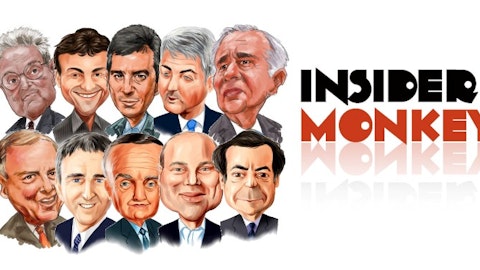Chano Fernandez: Yes, I think, as we commented on some of my prepared remarks, I mean clearly driving co-innovation with our partners across the platform is very critically important. You would say, where you draw the line when something is kind of would define or I would define the last mile in a particular industry or we need some more content-driven specific understanding of that value-add in that industry with a partner, there’s where we see an opportunity to collaborate with our partners. I mentioned some of these solutions that we’re building with — for different industries, like the revenue operation solution, again, that is very critical to the software and technology companies. There are others that would be a bit more, let’s say, across industries like the document management — employee document management that I provided on.
But honestly, we don’t see that as a core, let’s say, value add from us in terms of building that solution. But of course, it’s adding value to our customers there and partners take just advantage of the maturity of Extend to bring that value add that is resonating with our customers. So, we’re really pleased, as you can imagine, that customer partners can differentiate and bring additional offering to our customers.
DJ Hynes: Yes, makes sense. And then, Barbara, maybe I could sneak in a follow-up for you. The buyback is great to see us analysts always ask for more. Why not be more aggressive given where the stock is, the strength of the balance sheet, expected cash generation next year? Like what were the considerations there?
Aneel Bhusri: I’ll answer that one because I think Barbara probably wanted to do more. You just don’t know what you’re going into a tough economic environment and cash is king. And so we wanted to be conservative. And if we come out in a good market environment in the next six to nine months, you definitely could see more, but there’s just a balance of risk.
DJ Hynes: Yes, perfect. Okay. Thank you guys. Congrats.
Operator: Our next question is from Raimo Lenschow with Barclays. Please proceed with your question.
Raimo Lenschow: Hey, thank you. Congrats from me as well. Chano, the one thing that we’re seeing in the industry at the moment is that there seems to be more money in HR post-pandemic with a great reshuffle, et cetera. Could that — are you seeing that in terms of like interest of pockets over customers are? And do you think that’s kind of more a short-term thing and we’re at the back part of that trend, or do you think HR HCM strategically is having a new position in the enterprise? Thank you.
Chano Gomez: Thank you, Raimo for your question. I think both of them to be ones has some good tailwind out of the pandemic. But clearly, of course, that nets out of balance out with the macro environment we are living into. But I would say that now the financial transformations we see those in the market, and they are taking place as we speak. As a dynamic of companies having a tough time to just navigate through their finance modernization or honestly doing simple things like closing their books online in terms of many legacy platforms and in terms of a lot of manual processes that could just not happen once you were not in the office. Clearly, employee engagement as a whole in HCM, the skills area, all the machine learning and AI that we’re bringing to those processes are obviously value-add to the companies to see and want to take advantage of and continue to be a great tailwind for the HCM value proposition as a whole.





